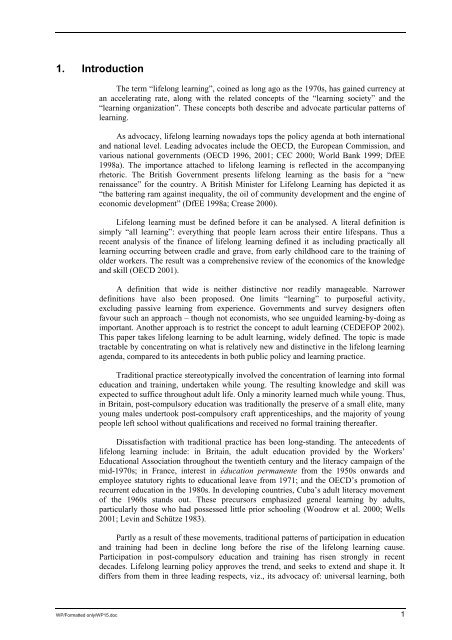Lifelong learning - International Labour Organization
Lifelong learning - International Labour Organization
Lifelong learning - International Labour Organization
Create successful ePaper yourself
Turn your PDF publications into a flip-book with our unique Google optimized e-Paper software.
1. Introduction<br />
The term “lifelong <strong>learning</strong>”, coined as long ago as the 1970s, has gained currency at<br />
an accelerating rate, along with the related concepts of the “<strong>learning</strong> society” and the<br />
“<strong>learning</strong> organization”. These concepts both describe and advocate particular patterns of<br />
<strong>learning</strong>.<br />
As advocacy, lifelong <strong>learning</strong> nowadays tops the policy agenda at both international<br />
and national level. Leading advocates include the OECD, the European Commission, and<br />
various national governments (OECD 1996, 2001; CEC 2000; World Bank 1999; DfEE<br />
1998a). The importance attached to lifelong <strong>learning</strong> is reflected in the accompanying<br />
rhetoric. The British Government presents lifelong <strong>learning</strong> as the basis for a “new<br />
renaissance” for the country. A British Minister for <strong>Lifelong</strong> Learning has depicted it as<br />
“the battering ram against inequality, the oil of community development and the engine of<br />
economic development” (DfEE 1998a; Crease 2000).<br />
<strong>Lifelong</strong> <strong>learning</strong> must be defined before it can be analysed. A literal definition is<br />
simply “all <strong>learning</strong>”: everything that people learn across their entire lifespans. Thus a<br />
recent analysis of the finance of lifelong <strong>learning</strong> defined it as including practically all<br />
<strong>learning</strong> occurring between cradle and grave, from early childhood care to the training of<br />
older workers. The result was a comprehensive review of the economics of the knowledge<br />
and skill (OECD 2001).<br />
A definition that wide is neither distinctive nor readily manageable. Narrower<br />
definitions have also been proposed. One limits “<strong>learning</strong>” to purposeful activity,<br />
excluding passive <strong>learning</strong> from experience. Governments and survey designers often<br />
favour such an approach – though not economists, who see unguided <strong>learning</strong>-by-doing as<br />
important. Another approach is to restrict the concept to adult <strong>learning</strong> (CEDEFOP 2002).<br />
This paper takes lifelong <strong>learning</strong> to be adult <strong>learning</strong>, widely defined. The topic is made<br />
tractable by concentrating on what is relatively new and distinctive in the lifelong <strong>learning</strong><br />
agenda, compared to its antecedents in both public policy and <strong>learning</strong> practice.<br />
Traditional practice stereotypically involved the concentration of <strong>learning</strong> into formal<br />
education and training, undertaken while young. The resulting knowledge and skill was<br />
expected to suffice throughout adult life. Only a minority learned much while young. Thus,<br />
in Britain, post-compulsory education was traditionally the preserve of a small elite, many<br />
young males undertook post-compulsory craft apprenticeships, and the majority of young<br />
people left school without qualifications and received no formal training thereafter.<br />
Dissatisfaction with traditional practice has been long-standing. The antecedents of<br />
lifelong <strong>learning</strong> include: in Britain, the adult education provided by the Workers’<br />
Educational Association throughout the twentieth century and the literacy campaign of the<br />
mid-1970s; in France, interest in éducation permanente from the 1950s onwards and<br />
employee statutory rights to educational leave from 1971; and the OECD’s promotion of<br />
recurrent education in the 1980s. In developing countries, Cuba’s adult literacy movement<br />
of the 1960s stands out. These precursors emphasized general <strong>learning</strong> by adults,<br />
particularly those who had possessed little prior schooling (Woodrow et al. 2000; Wells<br />
2001; Levin and Schütze 1983).<br />
Partly as a result of these movements, traditional patterns of participation in education<br />
and training had been in decline long before the rise of the lifelong <strong>learning</strong> cause.<br />
Participation in post-compulsory education and training has risen strongly in recent<br />
decades. <strong>Lifelong</strong> <strong>learning</strong> policy approves the trend, and seeks to extend and shape it. It<br />
differs from them in three leading respects, viz., its advocacy of: universal <strong>learning</strong>, both<br />
WP/Formatted only/WP15.doc 1

















